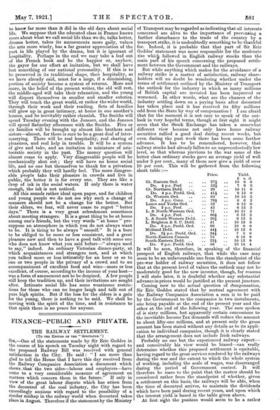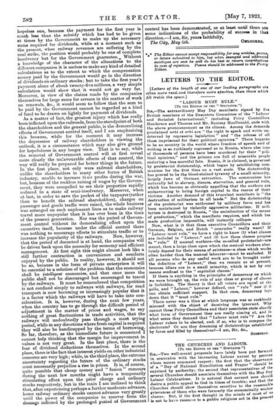FINANCE—PUBLIC AND PRIVATE.
THE RAILWAY SETTLEMENT.
(To TM Eprroa or THE " SPECTATOB."] SIR,—One of the statements made by Sir Eric Geddes in the course of his speech on Tuesday night with regard to the proposed Railway Bill was received with general satisfaction in the City. He said : " I am more than glad to tell the House that I have this day received from the Railway Companies Association a document which shows .that the two sides—labour and employers—have come to a very considerable measure of agreement on matters which concern them in the future." If only in view of the great labour dispute which has arisen from the decontrol of the coal industry, the City has been exceedingly anxious with regard to the possibility of a similar mishap in the railway world when decontrol takes Place in August. Therefore if the statement by the Ministry of Transport may be regarded as indicating that all interests concerned are alive to the importance of preventing a further disturbance to the trade of the country by a transport strike, it is undoubtedly something to be thankful for. Indeed, it is probable that that part of Sir Eric Geddes' statement was more responsible for the moderate rise whick followed in English railway stocks than the main pal( of his speech concerning the proposed settle- ment between the Government and the railways. But while anything which makes for the avoidance of a railway strike is a matter of satisfaction, railway share- holders will no doubt be wondering whether under the terms of settlement outlined by the Ministry of Transport the outlook for the industry in which so many millions of British capital are invested has been improved or worsened. In other words, what are the chances of the industry settling down on a paying basis after decontrol has taken place and it has received its fifty millions odd from the State by way of compensation 1 I am afraid that for the moment it is not easy to speak of the out- look in very hopeful terms, though at first sight it might seem that the Stock Exchange has taken a somewhat different view because not only have home railway securities rallied a good deal during recent weeks, but even during the past week there has been some further advance. It has to be remembered, however, that railway stocks had already fallen to an unprecedentedly low level, so that whereas previous to the war some of the better class ordinary stocks gave an average yield of well under 5 per cent., many of them now give a yield of over 10 per cent. This will be gathered from the following short table :—
Price.
Yield.
s. d.
Gt. Eastern Ord. .. 271
• •
10 0 0 Do. 4 p.c. Pref- 531
7 9 3 Gt. Northern Defd. 26
10 11 6 Do. 4 p.c. Prefd. Ord. .. 411
9 13 0 Gt. Western Ord. 69
10 10 3 Do. 5 p.c. Guar. .. 794
6 6 3 Lanes and Yorks Ord. .. 52
8 13 0 Do. 3 p.c. Pref. .. 45
6 13 3 L. & North-Western Ord. .. 71
10 11 3 Do. 4 p.c. Pref. 601
6 12 3 L. & South-Western Defd. 201
9 15 3 L. Brighton & S. C. Defd. .. 41
10 19 6 Do. 6 p.c. Prefd. Ord. .. 60
10 0 0 Midland Defd. .. 441
10 13 8 Do. 24 p.c. Prefd. Ord. .. 344
7 5 0 North-Eastern Consols .. 75
9 18 9 South-Eastern Defd. 231
10 12 9 Do. 6 p.c. Prefd. Ord .. 56 .. 10 14 4
It will be seen, therefore, in speaking of the financial prospect of English railways, that while the case may seem to be an unfavourable one from the standpoint of the pre-war holder of railway securities, it does not follow that at the present level of values the outlook may not bo moderately good for the new investor, though, for reasons I will state later, it is doubtful whether any substantial advance in prices would be justified at the present juncture.
Coming now to the actual question of dbmpensation, Sir Eric Geddes stated that by mutual agreement with the Railway Companies Association a sum is to be paid by the Government to the companies in two instalments, one being payable at the end of the present year and the other at the end of the following year. The sum spoken of is sixty millions, but apparently certain concessions to the inevitable Income Tax demands will reduce the amount to about fifty-one millions, and at present only the gross amount has been stated without any details as to its appli- cation to individual companies, though it is clearly stated that the arrangement does not include Irish railways. Probably no one but the experienced railway expert— and conceivably his view would be biased—can really determine whether this proposed settlement is equitable, having regard to the great services rendered by the railways during the war and the extent to which the whole system of working, including the scale of wages, was disarranged during the period of Government control. It will therefore be more to the point that the matter should be considered rather from the standpoint of whether, given a settlement on this basis, the railways will be able, when the time of decontrol arrives, to maintain the dividends which have been paid during recent years, and upon which the interest yield is based in the table given above. At first sight the position would seem to be a rather
hopeless one, because the payment for the first year is much less than the subsidy which has had to be given at times by the Government to make up the necessary gums required for dividends, while at a moment such as the present, when railway revenues are suffering by the coal strike, the position would probably be one of complete insolvency but for the Government guarantee..., Without a knowledge of the character of the allocations to the different companies it is useless to make any kind of detailed calculations as to the extent to which the compensation money paid by the Government would go in the direction of dividends on ordinary stocks; but to take the first year's payment alone of about twenty-five millions, a very simple calculation would show that it would not go very far. Moreover, in view of the claims made by the companies themselves for large sums for arrears in the matter of work on renewals, &c., it would seem to follow that the sum to be paid by the Government cannot be regarded as a kind of fund to be drawn on lightly for payment of dividends.
As a matter of fact, the greatest injury which has really been inflicted upon the railroads, from the standpoint of both the shareholders and the general public, is the demoralizing effects of Government control itself, and I am emphasizing this because, while for the moment it may increase the depression of railway shareholders in viewing the outlook, it is a circumstance which may also give ground for hopefulness in any longer view. That is to say, while the removal of Government control will at first reveal more clearly the unfavourable effects of that control, the way will really be prepared for better things in the future. In the first place, not only were railroad shareholders, unlike the shareholders in many other forms of British industry, unable to increase tl eir profits during the war, but, because of the reckless raising of wages by the Govern- ment, they were compelled to see their properties rapidly reduced to a state of semi-insolvency. Moreover, when at last, in order to save the pocket of the taxpayer (rather than to benefit the railroad shareholders), charges on passenger and goods traffic were raised, the whole business was arranged on such unpleasant lines as to make railway travel more unpopular than it has ever been in the time of the present generation. Nor was the period of Govern- ment control without its demoralizing effect upon the executive itself, because under the official control there was nothing to encourage efforts to stimulate traffic or to
increase the popularity of the railways. Now, however, that the period of decontrol is at hand, the companies will be driven back upon the necessity for economy and efficient management. At first sight this might almost look like a still further contraction in convenience and comforts enjoyed by the public. In reality, however, it should not be so, because in the form of private enterprises it will be essential to a solution of the problem that the economies shall be intelligent economies, and that once more the public shall not be discouraged but encouraged to travel by the railways. It must be remembered that competition is not confined simply to railways with railways, for road transport is now becoming so increasingly popular that it is a factor which the railways will have to take into con- sideration. It is, however, during the next few years, when the country has to go through the difficult period of adjustment in the matter of prices and wages, to say nothing of great fluctuations in trade activities, that the railways will undoubtedly pass through a most trying period, while in any directions where fresh capital is required they will also be handicapped by the terms of borrowing. So far, therefore, as the immediate future is concerned I cannot help thinking that the margin for improvement in values is not very great. In the first place, there is the fear of dividend deductions themselves. In the second place, there is the fact that interest yields on other industrial concerns are very high ; while, in the third place, the extreme uncertainty regarding the future of the ordinary stocks must necessarily prejudice a rise in prices. It is, of course, quite possible that cheap money and " fusion " rumours during the -next few months might have a temporarily stimulating effect upon the prior charge and ordinary stocks respectively, but in the main I am inclined to think that, after experiencing perhaps a further moderate advance, home railway ordinary stocks cannot advance very greatly until the power of the companies to recover from the damage inflicted by the prolonged period of Government
control has been demonstrated, or at least until there are some indications of the probability of success in that direction.—I am, Sir, yours faithfully,



































 Previous page
Previous page